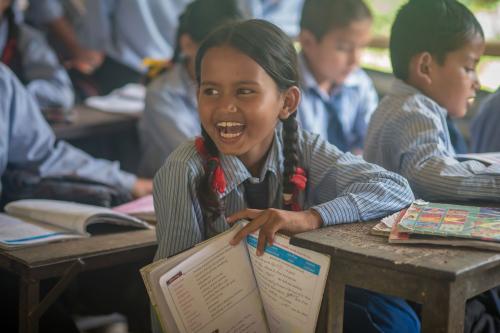Today’s youth face many challenges. About 238 million young people live in poverty. More than 25 million are unable to read and write. And close to 30 million are unemployed. In 2011, 20 million out-of-school adolescents lived in countries affected by conflict, with today’s estimations much larger. With the 2014 International Youth Day’s theme of Mental Health Matters, our concerns should also include the mental health conditions that around 20 percent of youth around the world face. The stigma associated with such conditions often leads to discrimination and exclusion from the opportunity to participate in education, work, and cultural activities—negatively impacting the ability of youth to become both socially and economically engaged in the world around them.
While millions of youth continue to face challenges and undergo associated psychological impacts, progress is being made. In the face of hardship, civil society and the international community are rallying to make sure that young people have the critical skills, tools, and support they need to become healthy, productive and engaged members of society. Today’s youth bring great leadership and resilience.
Yesterday was International Youth Day, and we at the Center for Universal Education applaud and celebrate youth who have taken center stage in fighting injustices in their homes, communities, and around the globe demonstrating that, given the right skills, they can make a difference. Josephine Kulea, one of the current Mandela Washington Fellows created by the African Leaders’ Initiative, founded an organization that has helped more than 100 girls in northeastern Kenya receive an education and escape early marriage and sexual abuse. In November 2013, Cecilia Chapiro, Bozhanka Vitanova, Nicolas Chinot, and Logan Graham together cofounded Yunus and Youth, a global network that connects young people who are using business to drive social change with leading social entrepreneurs. And this year, youth from Small Island Developing States (SIDS) launched “Our SIDS. Our Future” campaign to highlight issues affecting their nations and to encourage youth partnerships.
Civil society actors have also placed emphasis on youth. The Workforce Connections project utilizes evidence-based learning in order to build consensus on the best approaches to funding, implementation, and measurement of soft skills (e.g. team work, communication, leadership) among key stakeholders in the workforce development field. The Learning Metrics Task Force has recommended competencies in seven domains of learning and learning indicators for global tracking in order to improve learning, starting from early childhood to beyond post-primary. And through the Study Hall Foundation, young girls at the Prerna Girls School in India are now leading community dialogues in the surrounding villages, challenging the issues of child marriage and domestic violence that persist across their nation.
This time last year, the Youth Advocacy Group presented the Youth Resolution calling on leaders and civil society around the world to hold themselves accountable for six actions, including ensuring young people have the opportunity to learn and be prepared for life and the workforce. Today, 122 governments around the world have adopted national youth policies that focus on the enhancement of youth development and in October, the first Global Forum on Youth Policies will bring together over 700 government ministers, youth, and experts to share experiences, lessons learned, and best practices in order to set out guiding principles for youth policy development. During the World Conference on Youth 2014 held in Sri Lanka, leaders around the world endorsed mainstreaming youth into the post-2015 process. In the Colombo Declaration on Youth the ministers called for policies that address youth concerns across the sectors. Both the Muscat Agreement and the Open Working Group for Sustainable Development Goals include specific targets around the learning opportunities, knowledge, and skills youth need for decent work and life.
Today as we acknowledge and celebrate youth around the world, let us pledge to continue the momentum and together work to ensure that youth, especially the most vulnerable and marginalized, are equipped with the proper skills and tools needed to lead us towards a better world.
The Brookings Institution is committed to quality, independence, and impact.
We are supported by a diverse array of funders. In line with our values and policies, each Brookings publication represents the sole views of its author(s).




Commentary
International Youth Day: Reflections on the Importance and Promise of Young People
August 13, 2014